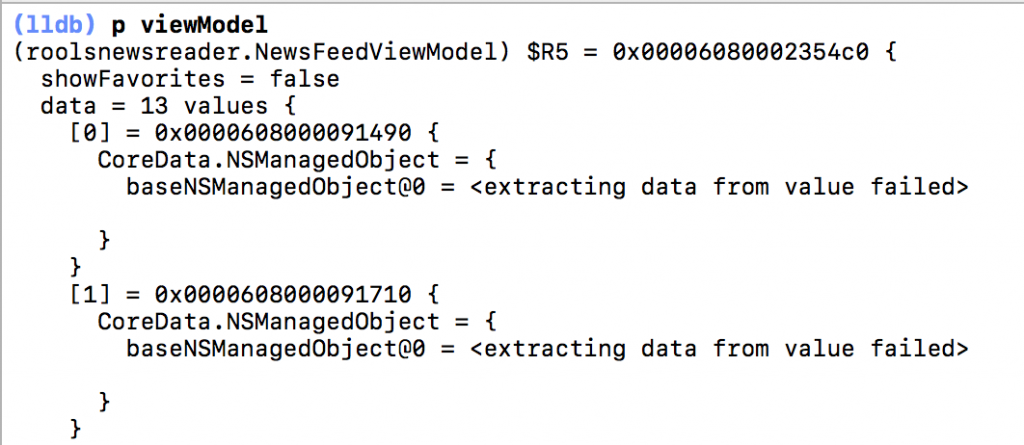We all use the occasional print statement in our code to help with debugging. Advanced users use breakpoints to inspect the values of variables and state. I never knew there where so many helper methods for your lldb debugger.


For a long time I’ve been using the po variable in the debugger to inspect the variable, or even to evaluate a query like po variable.property. Seems I learn something new every time I do some research on the Xcode debugger.
I recently discovered Chisel, a collection of even more helpful lldb commands. I’ve listed all the available commands below.
(lldb) help Debugger commands: apropos -- List debugger commands related to a word or subject. breakpoint -- Commands for operating on breakpoints (see 'help b' for shorthand.) bugreport -- Commands for creating domain-specific bug reports. command -- Commands for managing custom LLDB commands. disassemble -- Disassemble specified instructions in the current target. Defaults to the current function for the current thread and stack frame. expression -- Evaluate an expression on the current thread. Displays any returned value with LLDB's default formatting. frame -- Commands for selecting and examine the current thread's stack frames. gdb-remote -- Connect to a process via remote GDB server. If no host is specified, localhost is assumed. gui -- Switch into the curses based GUI mode. help -- Show a list of all debugger commands, or give details about a specific command. kdp-remote -- Connect to a process via remote KDP server. If no UDP port is specified, port 41139 is assumed. language -- Commands specific to a source language. log -- Commands controlling LLDB internal logging. memory -- Commands for operating on memory in the current target process. platform -- Commands to manage and create platforms. plugin -- Commands for managing LLDB plugins. process -- Commands for interacting with processes on the current platform. quit -- Quit the LLDB debugger. register -- Commands to access registers for the current thread and stack frame. script -- Invoke the script interpreter with provided code and display any results. Start the interactive interpreter if no code is supplied. settings -- Commands for managing LLDB settings. source -- Commands for examining source code described by debug information for the current target process. target -- Commands for operating on debugger targets. thread -- Commands for operating on one or more threads in the current process. type -- Commands for operating on the type system. version -- Show the LLDB debugger version. watchpoint -- Commands for operating on watchpoints. Current command abbreviations (type 'help command alias' for more info): add-dsym -- Add a debug symbol file to one of the target's current modules by specifying a path to a debug symbols file, or using the options to specify a module to download symbols for. attach -- Attach to process by ID or name. b -- Set a breakpoint using one of several shorthand formats. bt -- Show the current thread's call stack. Any numeric argument displays at most that many frames. The argument 'all' displays all threads. c -- Continue execution of all threads in the current process. call -- Evaluate an expression on the current thread. Displays any returned value with LLDB's default formatting. continue -- Continue execution of all threads in the current process. detach -- Detach from the current target process. di -- Disassemble specified instructions in the current target. Defaults to the current function for the current thread and stack frame. dis -- Disassemble specified instructions in the current target. Defaults to the current function for the current thread and stack frame. display -- Evaluate an expression at every stop (see 'help target stop-hook'.) down -- Select a newer stack frame. Defaults to moving one frame, a numeric argument can specify an arbitrary number. env -- Shorthand for viewing and setting environment variables. exit -- Quit the LLDB debugger. f -- Select the current stack frame by index from within the current thread (see 'thread backtrace'.) file -- Create a target using the argument as the main executable. finish -- Finish executing the current stack frame and stop after returning. Defaults to current thread unless specified. image -- Commands for accessing information for one or more target modules. j -- Set the program counter to a new address. jump -- Set the program counter to a new address. kill -- Terminate the current target process. l -- List relevant source code using one of several shorthand formats. list -- List relevant source code using one of several shorthand formats. n -- Source level single step, stepping over calls. Defaults to current thread unless specified. next -- Source level single step, stepping over calls. Defaults to current thread unless specified. nexti -- Instruction level single step, stepping over calls. Defaults to current thread unless specified. ni -- Instruction level single step, stepping over calls. Defaults to current thread unless specified. p -- Evaluate an expression on the current thread. Displays any returned value with LLDB's default formatting. parray -- Evaluate an expression on the current thread. Displays any returned value with LLDB's default formatting. po -- Evaluate an expression on the current thread. Displays any returned value with formatting controlled by the type's author. poarray -- Evaluate an expression on the current thread. Displays any returned value with LLDB's default formatting. print -- Evaluate an expression on the current thread. Displays any returned value with LLDB's default formatting. q -- Quit the LLDB debugger. r -- Launch the executable in the debugger. rbreak -- Sets a breakpoint or set of breakpoints in the executable. repl -- Evaluate an expression on the current thread. Displays any returned value with LLDB's default formatting. run -- Launch the executable in the debugger. s -- Source level single step, stepping into calls. Defaults to current thread unless specified. si -- Instruction level single step, stepping into calls. Defaults to current thread unless specified. sif -- Step through the current block, stopping if you step directly into a function whose name matches the TargetFunctionName. step -- Source level single step, stepping into calls. Defaults to current thread unless specified. stepi -- Instruction level single step, stepping into calls. Defaults to current thread unless specified. t -- Change the currently selected thread. tbreak -- Set a one-shot breakpoint using one of several shorthand formats. undisplay -- Stop displaying expression at every stop (specified by stop-hook index.) up -- Select an older stack frame. Defaults to moving one frame, a numeric argument can specify an arbitrary number. x -- Read from the memory of the current target process.
The commands added by Chisel:
Current user-defined commands: alamborder -- Put a border around views with an ambiguous layout alamunborder -- Removes the border around views with an ambiguous layout bdisable -- Disable a set of breakpoints for a regular expression benable -- Enable a set of breakpoints for a regular expression binside -- Set a breakpoint for a relative address within the framework / library that's currently running. This does the work of finding the offset for the framework / library and sliding your address accordingly. bmessage -- Set a breakpoint for a selector on a class, even if the class itself doesn't override that selector. It walks the hierarchy until it finds a class that does implement the selector and sets a conditionalbreakpoint there. border -- Draws a border around <viewOrLayer>. Color and width can be optionally provided. Additionally depth can be provided in order to recursively border subviews. caflush -- Force Core Animation to flush. This will 'repaint' the UI but also may mess with ongoing animations. dcomponents -- Set debugging options for components. dismiss -- Dismiss a presented view controller. fa11y -- Find the views whose accessibility labels match labelRegex and puts the address of the first result on the clipboard. findinstances -- Find instances of specified ObjC classes. flicker -- Quickly show and hide a view to quickly help visualize where it is. fv -- Find the views whose class names match classNameRegex and puts the address of first on the clipboard. fvc -- Find the view controllers whose class names match classNameRegex and puts the address of first on the clipboard. heapfrom -- Show all nested heap pointers contained within a given variable. hide -- Hide a view or layer. mask -- Add a transparent rectangle to the window to reveal a possibly obscured or hidden view or layer's bounds mwarning -- simulate a memory warning pa11y -- Print accessibility labels of all views in hierarchy of <aView> pa11yi -- Print accessibility identifiers of all views in hierarchy of <aView> pactions -- Print the actions and targets of a control. paltrace -- Print the Auto Layout trace for the given view. Defaults to the key window. panim -- Prints if the code is currently execution with a UIView animation block. pbcopy -- Print object and copy output to clipboard pblock -- Print the block`s implementation address and signature pbundlepath -- Print application's bundle directory path. pca -- Print layer tree from the perspective of the render server. pcells -- Print the visible cells of the highest table view in the hierarchy. pclass -- Print the inheritance starting from an instance of any class. pcomponents -- Print a recursive description of components found starting from <aView>. pcurl -- Print the NSURLRequest (HTTP) as curl command. pdata -- Print the contents of NSData object as string. pdocspath -- Print application's 'Documents' directory path. pinternals -- Show the internals of an object by dereferencing it as a pointer. pinvocation -- Print the stack frame, receiver, and arguments of the current invocation. It will fail to print all arguments if any arguments are variadic (varargs). pivar -- Print the value of an object's named instance variable. pjson -- Print JSON representation of NSDictionary or NSArray object pkp -- Print out the value of the key path expression using -valueForKeyPath: pmethods -- Print the class and instance methods of a class. poobjc -- Print the expression result, with the expression run in an ObjC++ context. (Shortcut for "expression -O -l ObjC++ -- " ) pproperties -- Print the properties of an instance or Class present -- Present a view controller. presponder -- Print the responder chain starting from a specific responder. ptv -- Print the highest table view in the hierarchy. pvc -- Print the recursion description of <aViewController>. pviews -- Print the recursion description of <aView>. rcomponents -- Synchronously reflow and update all components. sequence -- Run commands in sequence, stopping on any error. setinput -- Input text into text field or text view that is first responder. settext -- Set text on text on a view by accessibility id. show -- Show a view or layer. slowanim -- Slows down animations. Works on the iOS Simulator and a device. taplog -- Log tapped view to the console. unborder -- Removes border around <viewOrLayer>. unmask -- Remove mask from a view or layer unslowanim -- Turn off slow animations. visualize -- Open a UIImage, CGImageRef, UIView, or CALayer in Preview.app on your Mac. vs -- Interactively search for a view by walking the hierarchy. wivar -- Set a watchpoint for an object's instance variable. xdebug -- Print debug description the XCUIElement in human readable format. xnoid -- Print XCUIElement objects with label but without identifier. xobject -- Print XCUIElement details. xtree -- Print XCUIElement subtree. zzz -- Executes specified lldb command after delay.
